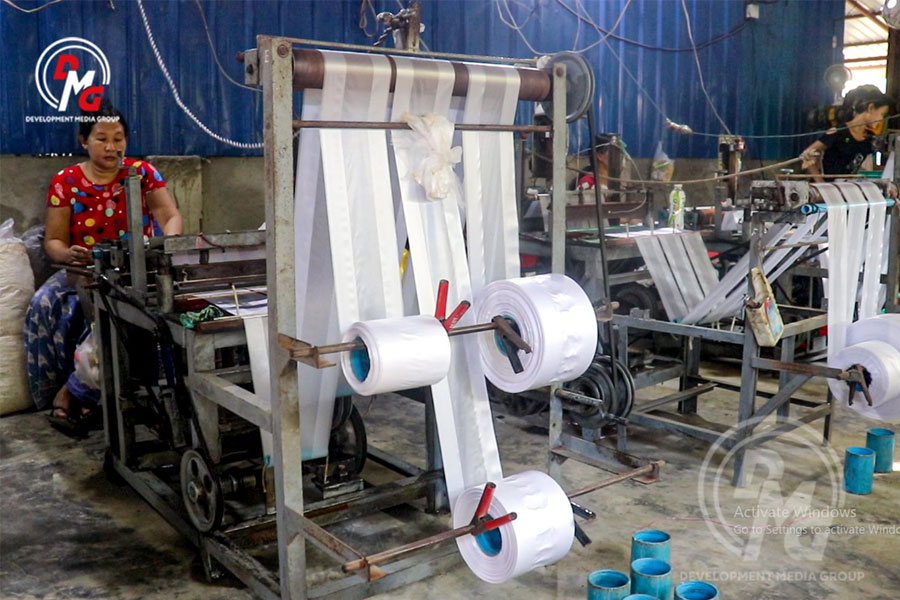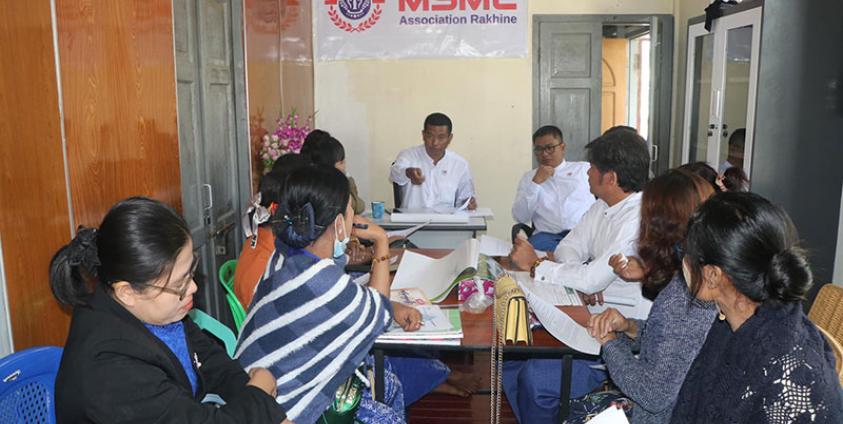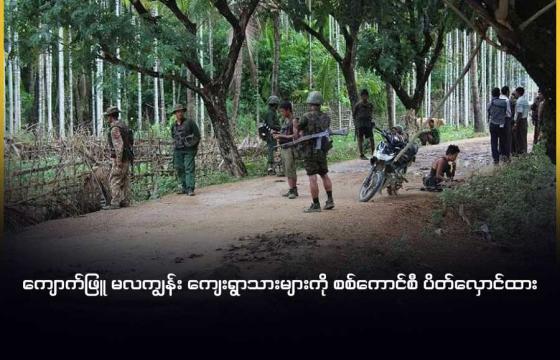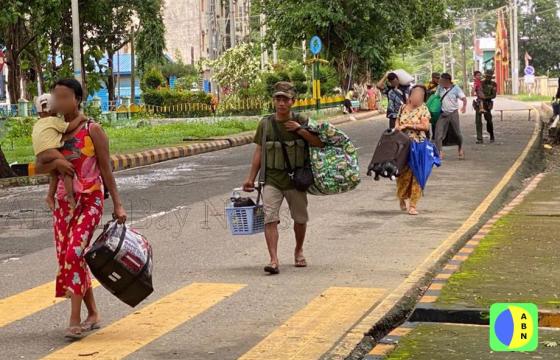Despite challenges, micro, small and medium-sized enterprises (MSMEs) in Arakan State were gaining momentum before the resumption of hostilities between the Myanmar junta and Arakkha Army (AA) late last year ground many businesses to a halt.
The regime has blockaded roads and waterways since the conflict began anew, cutting Arakan State off from other parts of the country in many respects.
Access to bank loans, technology and raw materials were some of the obstacles facing MSMEs in Arakan State even before the latest fighting, but the blockade has since forced many MSMEs to halt their operations entirely.
A member of the MSME Association Rakhine said: "There is no trade. All the trade activities are labelled illegal. It is also difficult to trade with India because of logistical problems and the Indian government's restrictions."
Frequent power cuts are another factor disrupting MSMEs' ability to function.
 "We need electricity for production. The impact was so huge that businesses almost collapsed. All the small-scale agricultural production, livestock farming and distribution have ground to a halt," the MSME Association Rakhine member said.
"We need electricity for production. The impact was so huge that businesses almost collapsed. All the small-scale agricultural production, livestock farming and distribution have ground to a halt," the MSME Association Rakhine member said.
While business owners have been hit hard, local residents employed by MSMEs are also suffering from livelihood hardships as a result.
Employers and Employees in Trouble
The traditional weaving industry was once a category of thriving MSMEs in Sittwe Township's Warr Bo Village, but the village is now empty as villagers have fled fighting in the area.
"All the villagers have fled," said Daw Ma Tin Thein, owner of Warr Bo Thu Weaving. "The whole village made a living by weaving. They are suffering from livelihood hardships as they can't weave now."
Her business employed more than 30 people who are now jobless.
An employee of Warr Bo Thu Weaving said: "My regular income was 150,000 kyats per month when I was employed as a weaver. Though it was not enough for the whole family, it was a source of regular income and I could at least buy rice. Weaving is the primary source of livelihood for the entire village. We have no jobs now."
The Shwe Kyar weaving workshop, which previously operated more than 100 looms, has been forced to suspend operations since the fighting resumed. Before that, products of the traditional weaving industry in Arakan State were distributed to markets inside the country and beyond its borders.
The Shwe Kyar weaving factory is pictured on May 17, 2023, days after Cyclone Mocha made landfall over Arakan State.
As is the case across much of the world, MSMEs are a major economic engine for regional economies in Southeast Asia. In Thailand, for example, MSMEs are involved in iron ore, rubber, timber, fisheries products and many other industries. Agricultural land covers 30 percent of the Thai countryside and the Thai government provides low-interest MSME loans for farmers annually, facilitating operations and ultimately providing a vital path to viability.
Arakan State is rich in fertile soil and farming potential, and animal husbandry and fishing businesses can be carried out on a commercial scale, but similar government assistance does not exist.
A small-scale fish breeder in Pauktaw Township said: "My business had been good, but I didn't have access to funds to expand my business. I suffered a huge loss after my fish farms were flooded during Cyclone Mocha last year. And I can't operate my fish farm since the fighting."
In recent years, established business owners and young people had high hopes that the development of MSMEs might reduce the brain drain and spur economic growth in Arakan State. Those prospects have substantially dimmed since the fighting kicked off in November 2023.
Regime Promises Versus Realities on the Ground
The junta says it is working to revive Myanmar's economy, which has tanked due to the Covid-19 pandemic and the political instability brought about by the military's 2021 coup. The regime has loftily claimed that it will disburse loans to boost the country's economy, replace foreign imports with domestic products, export more products abroad, and develop MSMEs.
The Arakan State military council in 2022 promised loans amounting to 10 billion kyats to support MSMEs in Arakan State. Local business owners say they have yet to receive money from the loan scheme for MSMEs announced more than two years ago.
Businesspeople in Arakan State acknowledge the regime has done some things to assist MSMEs, but most agree that the shortcomings overshadow any efforts worthy of commendation.
Myanmar's economy has deteriorated dramatically due to the current political situation, noted U Khin Maung Gyi, vice chairman of the Rakhine Economic Initiative Public Co., Ltd.
"Due to the lack of political stability, the country's economy plummeted. MSME entrepreneurs do not have raw materials nor can they produce finished goods, so the economic situation has completely collapsed," he said.
In addition to the difficulties wrought by the conflict in Arakan State, MSME entrepreneurs also face restrictions in applying for official business registration certificates, delays in obtaining licences, and the ever-present and unpredictable threat posed by natural disasters.
Out of Conflict's Ashes, New Hope?
MSMEs play an essential role in economic development, and the AA should give priority to facilitating these enterprises' success if Arakan State is granted self-autonomy in the future.
Arakan State remains mired in poverty due to lack of employment opportunities and decades of neglect by successive military regimes, as well as during the brief stint under the civilian National League for Democracy (NLD) government.
As a result, many Arakan State residents have left for foreign countries - and continue to do so on a daily basis - seeking prospects for a better life abroad. And as a result of this, the state's human resources have dwindled deleteriously over time.
Arakan State is rich in natural resources and arable land, and has managed to attract billions of dollars in foreign investment despite its challenges. The Chinese-backed oil and natural gas pipelines that begin at Kyaukphyu are an excellent example of the state's abundance. But those pipelines are also a case study in local resentment over a project that is widely perceived as providing little to no benefit to locals despite its scale and obvious money-making potential.
Poverty deepens while a privileged few rake in the cash.
Having suffered losses and hardship for generations, MSME entrepreneurs are nonetheless hopeful that a so-called "Arakkha People's Government" might turn the tide. The term presumes an AA takeover of Arakan State and the new governance that this would bring to millions of people.
"If Arakan State is granted self-autonomy, we still don't know what kind of policies the Arakkha government will implement regarding MSMEs," noted an official from the MSME Association Rakhine. "I hope the Arakkha government will emphasise the role of MSMEs."








